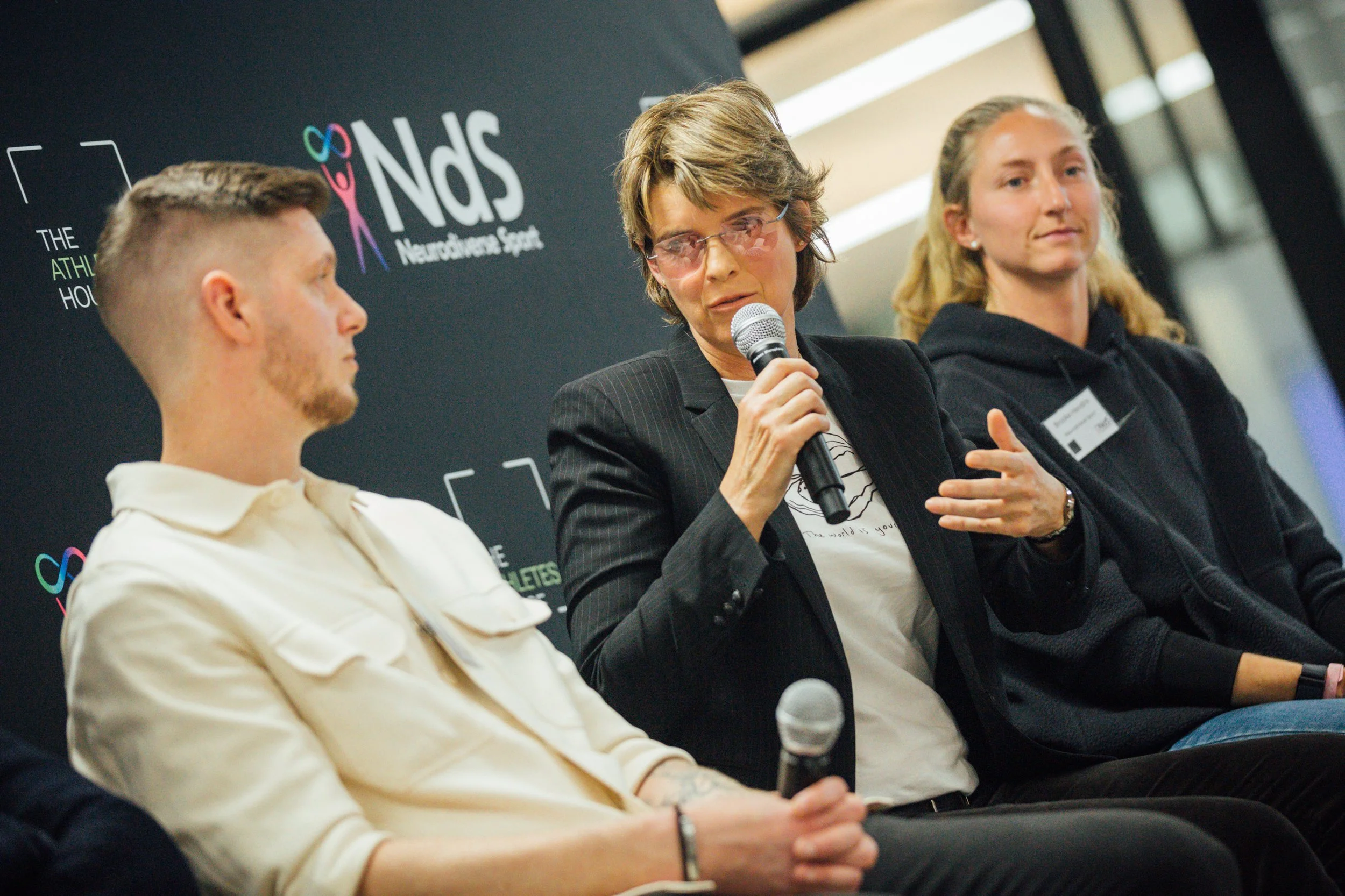“From Overwhelm to Action” — Reflections from the Neurodiverse Sport Panel
Written by Olivia Rae. Subheadings added by the Neurodiverse Sport team to support readability.
This is part two of a two-part blog by Olivia Rae, reflecting on the Neurodiverse Sport Neurodiversity Celebration Week event 2024. Subtitles have been added by the Neurodiverse Sport team to support readability.
Lights, Panels, and Powerful Words
Under those now very bright lights, a panel of athletes and advocates took to the stage—each one doing incredible things in sport, each one contributing to the Neurodiversity movement in a unique way.
Greg Halford (left), Sam Smith (middle), Brooke Hendrix (right)
Samantha Smith: Speaking the Sensory Truth
Former British No. 1 in tennis and current sports broadcaster Samantha Smith shared that the lights in the room were a real sensory challenge for her. It was validating and emotional to hear this said aloud.
Sam, like me, found out about her Neurodivergence later in life. As a player, she had difficulty regulating her behaviour and struggled to find coaches who understood her. But now, she’s speaking out, saying if she doesn’t talk about Neurodiversity in tennis—who will?
Brooke Hendrix: Team Acceptance
Reading Women’s footballer Brooke Hendrix has ADHD. She shared how she talks openly with her teammates about it, and the support she receives from them means the world to her. Her energy was so positive—it was contagious. I felt myself tearing up again.
Greg Halford: Reflection and Regret
Greg Halford, an ex-professional footballer, found out he was Autistic after his son’s diagnosis. He spoke about being moved between clubs because he didn’t fit certain dressing rooms. Managers didn’t understand him, but he still achieved so much.
As he spoke, I found myself flashing back to my own struggles in team environments. My sadness was overwhelming—but I stayed.
Nick Ransom (left), Matt Rogan (middle), Greg Halford (right)
Matt Rogan: The Power of Allyship
Then came Matt Rogan—an ally. A parent of two Dyslexic children and a passionate advocate for Neurodivergent athletes. He spoke as a father, a leader in the sports industry, and someone determined to help others navigate performance pathways.
His message stuck with me: if 20% of athletes are Neurodivergent, how many have never been enabled to reach their top level?
Creating Action from Waves
These panels created waves. Real momentum. They were not to be ignored.
Nick Ransom, an Autistic journalist and Neurodivergent consultant, asked each panellist what we should focus on in sport. The most common answer? Coaches and managers need more understanding and support.
Brooke said it’s easier to talk to players than coaches. Sam wished she’d had someone who understood her. Greg said we must stop shifting players around when the issue is systemic. Matt said coaches need to be more curious, more informed.
Successful teams take care of each other. They understand each other. That’s what Greg said—and it made me emotional all over again.
NdS Co-Founders Caragh McMurtry and Mikey Mottram
Investing in Neuroinclusion
Sam reminded us that sport has changed—it’s now a performance, a sensory experience. Music, lights, noise—this means we’ll start recognising Neurodiversity more quickly, but we must invest in ways to support it.
Matt tied everything together by returning to the storm and boats metaphor. We’re all navigating this together, but from very different places.
Even Nick, as the panel chair, shared a moment of vulnerability, joking that he was “too honest” in his feedback to a long-winded response. Then he explained it was part of his own Neurodivergence. Another validating moment.
Wrapping Up (Sort Of)
Before we broke into networking, Annie from The Athletes House shared her “why.” She reflected on everything she’d learned that evening—and openly shared that she is Autistic too.
At that point, I nearly broke.
I needed the quiet room. I missed the guided meditation. My emotions had built up so much I just couldn’t stay in the room any longer.
Let the Waves Carry On
This evening wasn’t just about learning—it was about being heard. And it was about those who are often pushed out being front and centre, finally shaping the conversation.
It’s hard to wrap this up, because I don’t want it to end. But here’s what I hope:
That the knowledge shared goes far and wide. That coaches learn to communicate differently. That environments become safer. And that we stop trying to push people back into a neurotypical box—or out of the picture altogether.
The waves started in that room. They’ve left the Collinson Group’s London office—and now they’re moving through the world.
If You’d Like to Hear More From Olivia…
Follow her on Instagram, Twitter, or connect with her on LinkedIn.
Takeaways From the Panel
For Neurodivergent Individuals:
Your voice belongs in the conversation.
Whether you're a current athlete, former player, or advocate, sharing your story can be healing for you—and empowering for others. Neurodivergent role models help shift systems.
For Peers and Supporters:
Advocacy can be collective.
Neurodivergent and non-neurodivergent people alike have a role in creating change. Allyship means listening, uplifting voices, and speaking up when systems don’t serve everyone.
For Coaches, Leaders, and Organisations:
Understanding must come before inclusion.
The panellists repeatedly emphasised that knowledge, curiosity, and adaptation from coaches and managers are essential. When leaders make space for difference, performance—and wellbeing—can thrive.



